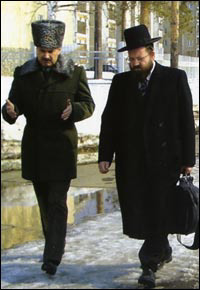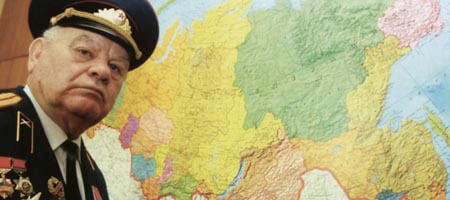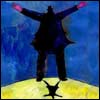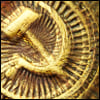During World War II, Simon Zokhorovich's father was a general in the Red Army before his untimely death. So as an orphan to a Soviet general, the young Zokhorovich was adopted by the army and sent to a dormitory where he was trained to join the ranks of his comrades as an officer.
Through the years, Zokhorovich was promoted up the chain of command, even joining the general staff of the Russian Army Academy. Today, Zokhorovich, a colonel, serves as its dean.
His was not the experience shared by many of his coreligionists living behind the Iron Curtain, to be sure, but Zokhorovich was privileged enough to be the son of a general who died serving his country. He also wasn't particularly religious, to begin with.
That's what makes his partnering with a rabbi to cater to Jewish troops all the more interesting.
"I never hid that I was Jewish," says Zokhorovich, who has served on every Russian front. "I was never an observant Jew, and I did not know what a Jewish commandment was.
"My knowledge was that I was the son to a nation and nothing more than that," he continues. "However, I was a proud of part of the nation, even though at times there was friction between the Soviet Union and Israel."
In short, "I was a proud and happy Communist Jew," he says, placing an emphasis on the Communist part of the identification. With the collapse of the Soviet Union, though, came the destruction of the Soviet part of Zokhorovich's identity.
And even Zokhorovich will admit that life as a Jew in the Russian army was not easy. He's always been willing to go out of his way, he points out, to make it easier for other Jews in the army. So when he heard that the Russian army was going to have a new rabbi, he wanted to be a partner.
"I never had a rabbi, and I hardly knew at that time what a rabbi was, but I decided that I will do anything in my power to bring a rabbi to the army," he relates.
One year ago, Zokhorovich approached the Russian minister of defense and asked to be the supervisor of Rabbi Aron Gurevitch, whom the Federation of Jewish Communities of the Commonwealth of Independent States appointed to be the army's first rabbi.
"I wanted to be a partner of this historic event in the Russian army," says Zokhorovich.
According to Gurevitch, the colonel is his greatest advocate.
A New Era for Russian Soldiers

As a teenager, Gurevitch studied in a Lubavitch yeshiva in Moscow before moving to Israel. He returned to Russia at the behest of Rabbi Berel Lazar, Chief Rabbi of Russia and director of Chabad-Lubavitch of Russia.
During the past year, the rabbi has started writing a column in the army Red Star newspaper. He arranges kosher food for any soldier who requests it and delivers the monthly Chabad-Lubavitch L'chaim magazine. He's currently preparing Chabad-Lubavitch rabbinical students to travel to bases across Russia for the High Holidays.
"Many of the Jews do not want anyone to know that they are Jewish," reports Gurevitch. "My mission is to give them pride in their Judaism and let them know that they have rights as Jews in the army."
The rabbi says the progress so far is just a beginning: "We still have a lot of work ahead of us. We will reach every Jew on every base."









Start a Discussion